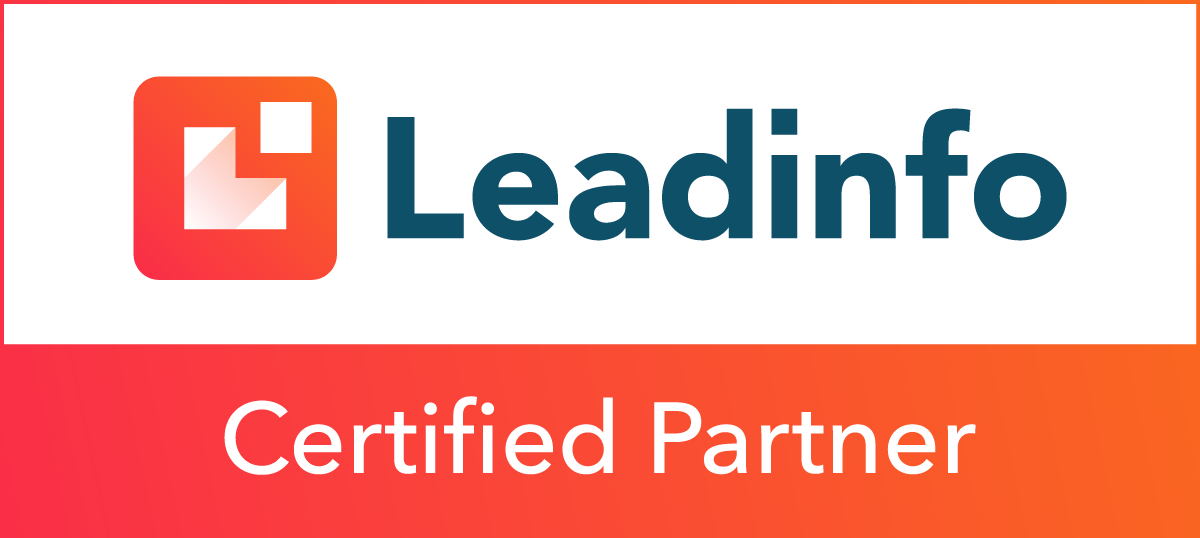What is local SEO?
Local SEO, or local search engine optimisation, is a digital marketing tactic that helps your business become visible to people in your area.
When someone in your town searches for a bakery, garden centre, or cleaning service, local SEO ensures that your business ranks at the top.

What is the difference between SEO and local SEO?
Both SEO and local SEO aim to improve your visibility in search results. The difference?
- SEO focuses on national or global visibility.
- Local SEO hones in on your visibility in your specific region.
Both use largely the same techniques, but local SEO adds extra steps to help you rank better locally.
What is SEO?
SEO, or Search Engine Optimisation, is about improving your ranking in search results through a combination of technical and creative strategies. Since Google accounts for more than 90% of global searches, SEO typically focuses on this search engine.
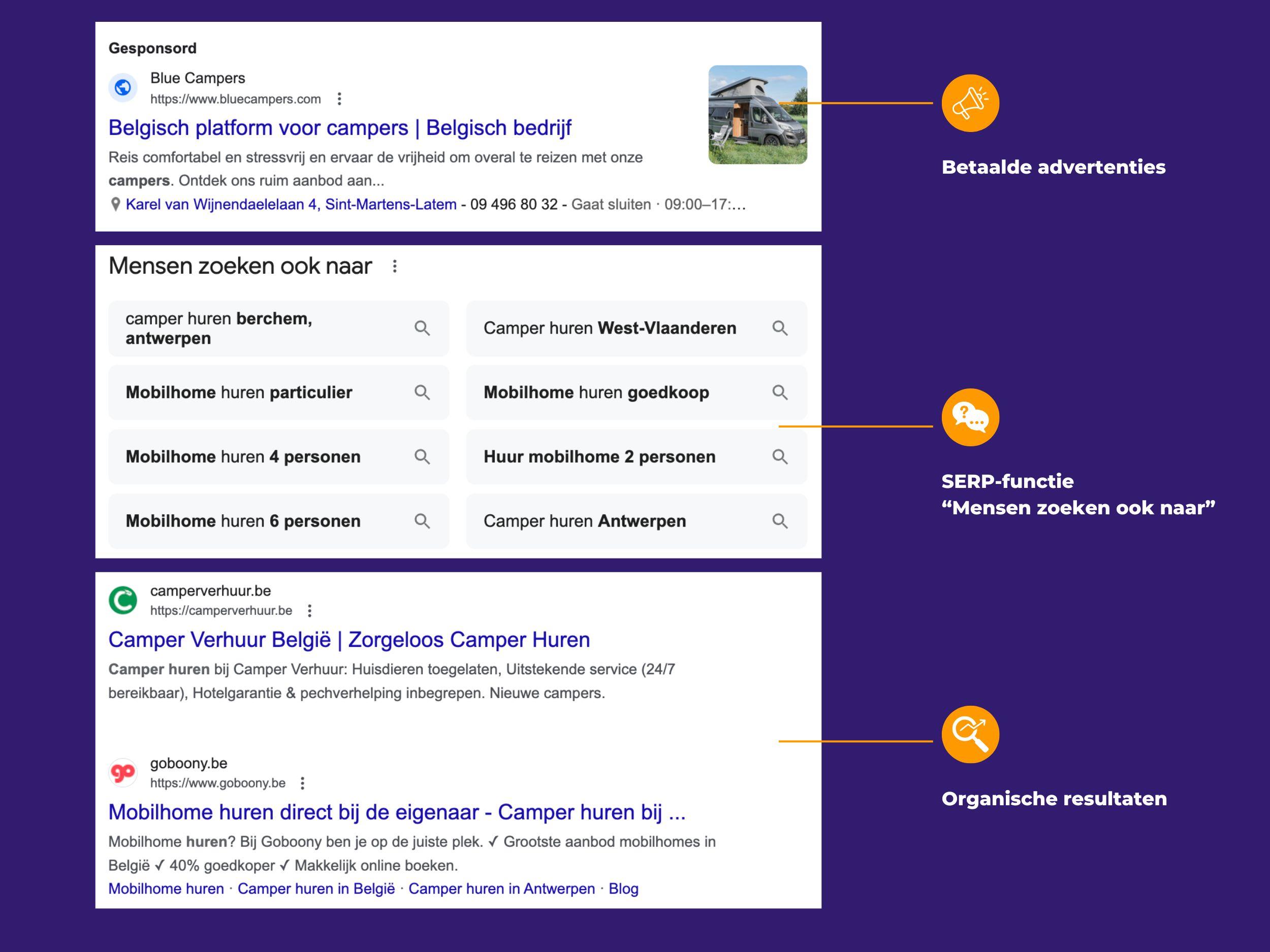
Search results explained
For a search like “hire a campervan,” you often see:
- Paid ads: Marked with “Ad,” these PPC ads appear at the top.
- SERP features: Special elements like featured snippets, reviews, or videos that provide immediate answers.
- Organic results: The unpaid results—this is what SEO focuses on.
Why is it important to rank at the top of organic results? 68% of clicks go to results in the top five. Higher rankings automatically translate into more traffic and revenue.
Proven SEO strategies
- Optimise your site for mobile: Ensure your site works well on smartphones, as more and more people search via mobile. For our clients, we see 70-85% of visits come from mobile devices.
- Use clear headings and subheadings: This makes it easier for both search engines and visitors to understand your page’s content. Make sure your headings (H1, H2, H3) are structured logically and emphasise key information for better readability and SEO.
- Improve your site speed: A faster website improves user experience and helps you rank higher on Google. Optimise images, minimise CSS and JavaScript, and use caching to reduce load times.
- Add internal links: Link to other relevant pages on your website. This keeps visitors on your site longer and helps search engines understand your content better.
- Publish fresh content regularly: Keep your website up-to-date and attract new visitors with relevant content. Write about customer stories, new products, and industry trends to keep your audience engaged.
Which businesses benefit from SEO?
Any business can benefit from SEO, but some need a more local approach. Let’s take a closer look at local SEO.
What is local SEO?
Local SEO focuses on people searching for products or services in your area. For example, if someone searches for “best roofer in Sint-Niklaas” and your roofing website is well-optimised, you’ll rank at the top.
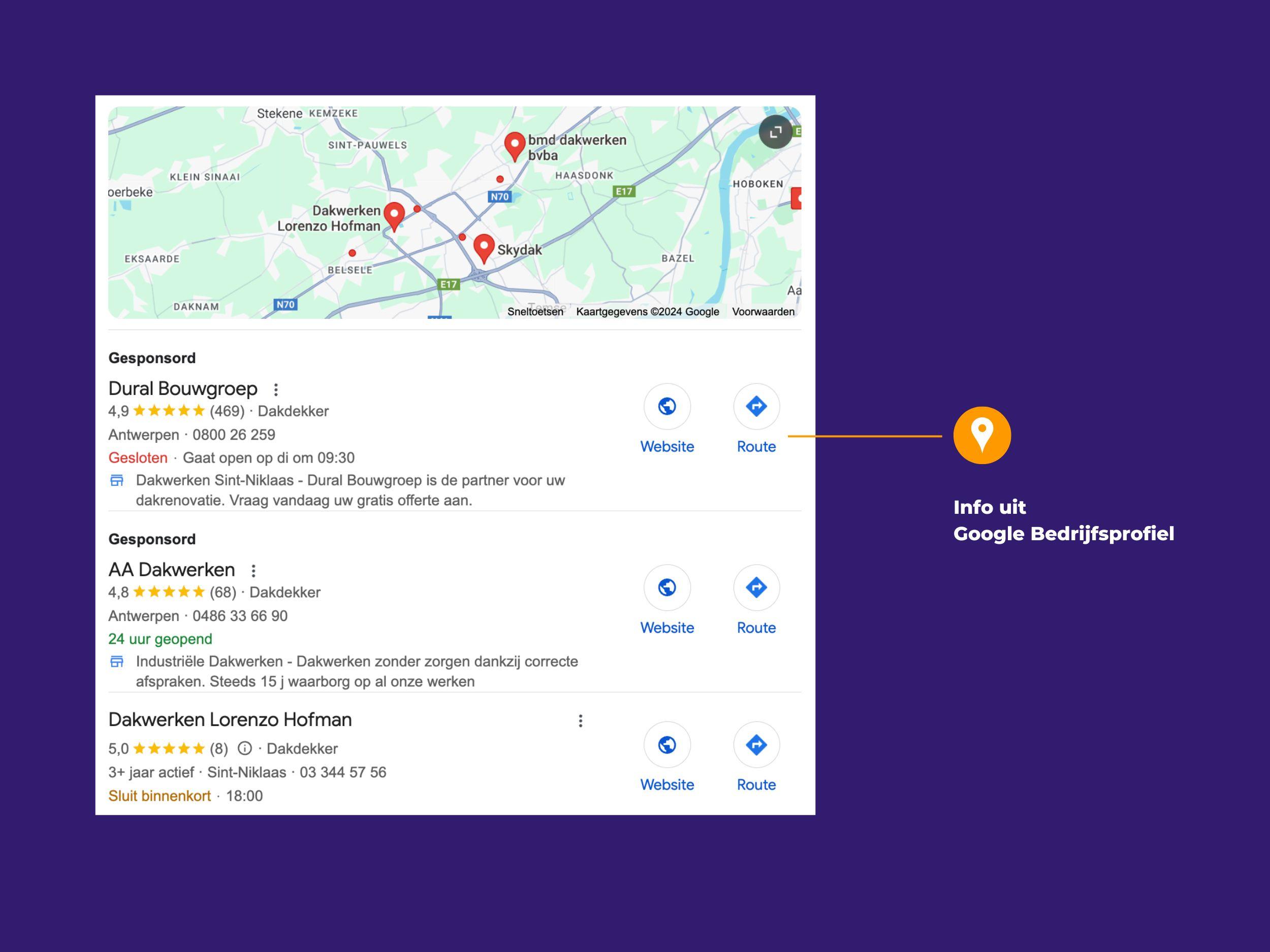
Local search results explained
In addition to paid ads and SERP features, you’ll often see a local 3-pack, a map showing the top three local businesses. Google pulls this info from your Google Business Profile, so make sure it’s up-to-date.
For certain services, you can also add ads through Local Service Ads, further boosting your visibility. These ads appear above the regular search results and provide a powerful way to connect with customers looking for specific services in your area.
Strategies for local SEO
Now that you understand local SEO, you might wonder how to get started. In addition to standard SEO tactics, focus on:
- Local keywords: Research and use local search terms in your content.
- Consistent NAP data: Ensure your business information is the same across all websites and directories.
- Optimise your Google Business Profile: Complete your profile with accurate and up-to-date information.
- Gather reviews: Encourage satisfied customers to leave positive reviews on your Google Business Profile.
- Earn local backlinks: Get other local websites to link to yours to increase your authority.
Who benefits from local SEO?
Local SEO is perfect for businesses that want to attract customers from their local area. But don’t be mistaken—local SEO isn’t just for small neighbourhood businesses.
A local bakery, for example, might have multiple branches. Despite their scale and local reputation, local SEO is still crucial for making each shop visible in non-branded searches and promoting local offers.
Even larger companies with 2 to 10 branches across broader regions can benefit from local SEO. While they may enjoy regional recognition, local SEO helps them continue attracting new customers and outshine local competitors.
Finally, national players benefit from being visible everywhere. Local SEO strengthens their presence by optimising each branch’s visibility in every local market with a well-optimised Google Business Profile, mobile-friendly landing pages, and local ads.
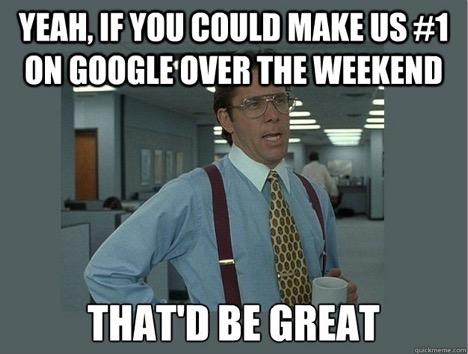
Do SEO and local SEO influence each other?
It’s hard to draw a strict line between traditional SEO and local SEO, as they often overlap. When used smartly, SEO and local SEO reinforce each other. When your general SEO is strong, local SEO tends to deliver faster results. Likewise, local SEO can improve your overall SEO performance.
Need help finding the right balance between SEO and local SEO? Tailpage can help you maximise your strategy.
SEO vs. SEA
In addition to (local) SEO, you’ve likely heard of SEA. Both terms are closely related to search engines and help you become visible on the first page of Google, Bing, or DuckDuckGo.
The key difference? SEO (Search Engine Optimisation) focuses on organic, unpaid search results, while SEA (Search Engine Advertising) revolves around paid ads, usually through Google Ads.
Key differences between SEO and SEA
- SEO is a long-term strategy: it can take weeks or months to achieve strong rankings. SEA delivers immediate results.
- SEO data is harder to track, while SEA provides insights into costs and conversions.
- Paid results appear at the top of the search page, while organic results are further down.
- Once you invest in SEO, the results are sustainable. When you stop an SEA campaign, your visibility disappears.
- SEO is cost-effective because clicks on organic results are free.
While SEA offers advantages, ranking high in organic search results is essential. Many people ignore ads, whereas SEO provides visibility and sustainable results.
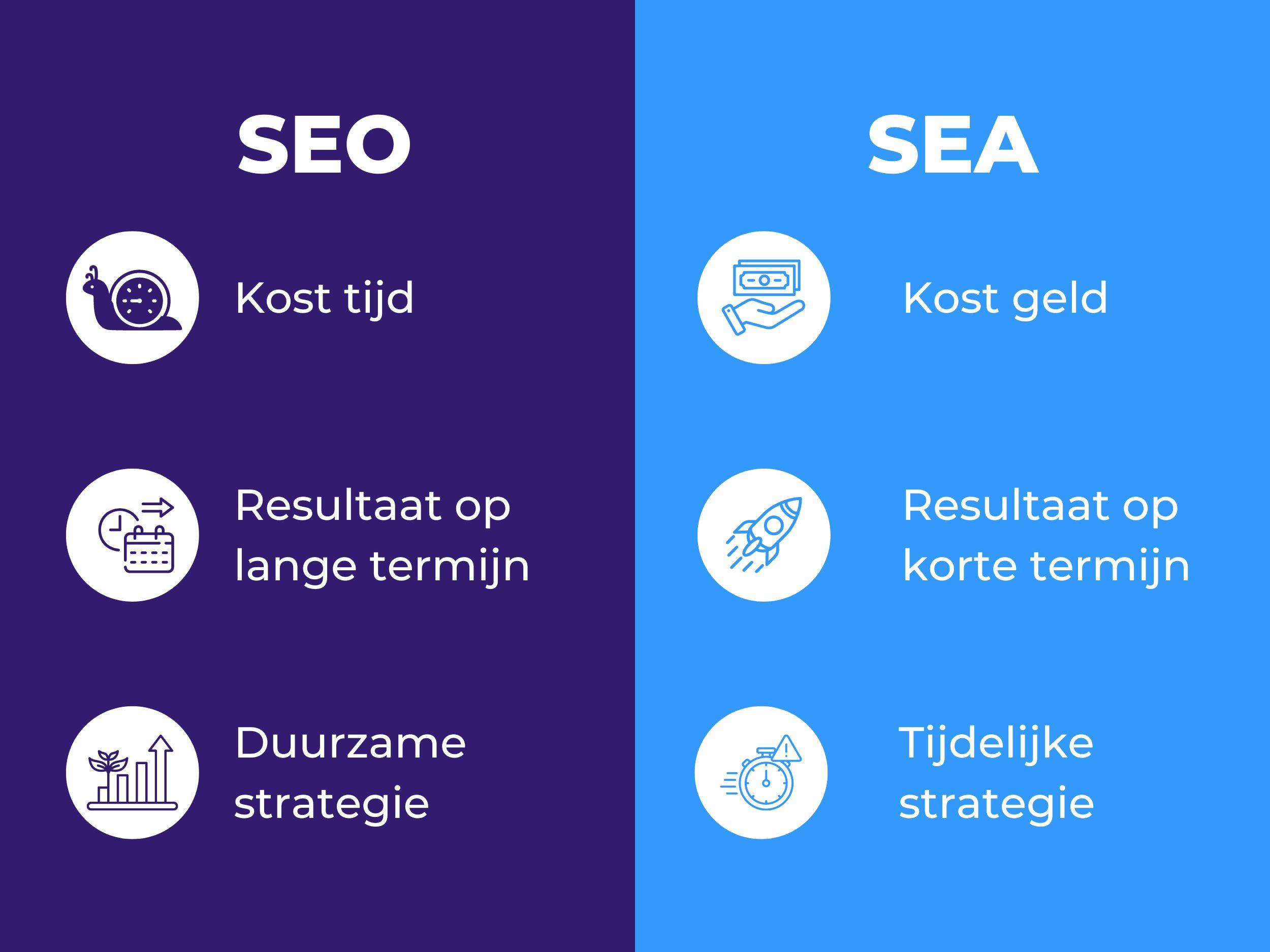
Combining SEO and SEA
A mix of both strategies is often the most effective. SEA provides immediate feedback on keywords and helps you understand what your target audience is searching for. These insights can help you adjust your SEO strategy for better performance.
Ultimately, quality matters more than quantity: better to have 25 visitors leading to 3 new leads than 2,500 visitors with no results.
SEO on other search engines
In most countries, the focus is heavily on Google-first SEO, and Belgium is no exception. However, this isn't always the best approach. There are plenty of other search engines that can also present our brands to the target audience.
Why optimise for other search engines?
There are a few good reasons to look beyond Google:
- Google’s market position: By far the most dominant search engine, but it can experience fluctuations.
- Lower rankings on other search engines: Focusing solely on Google may mean you miss out on opportunities with other search engines.
- Engagement from your audience: Due to increasing privacy concerns, some people choose to avoid Google and opt for search engines that respect their data more. Depending on what your audience is looking for, they may turn elsewhere.

Traditional search engines
When most people think of Google competitors, these names often come to mind:
- Bing: Microsoft’s search engine is smaller but remains relevant due to loyal users and integrations with Microsoft products. Bing values social signals like likes and shares more than Google.
- Yahoo: Yahoo uses Bing’s technology for its search results, so optimisations for Bing will also apply to Yahoo.
- Ecosia: With over 15 million users, Ecosia donates 80% of its profits to environmental projects. It mostly relies on Bing for search results, so optimising for Bing also helps with Ecosia.
Alternative search engines
- Amazon: Primarily a retail platform, but also functions as a search engine for products. Optimised product pages and the use of relevant keywords are crucial for better visibility and sales.
- YouTube: Popular for tutorials, product reviews, and vlogs. Strong titles, tags, and descriptions increase visibility. Attractive thumbnails and optimised video content also help boost engagement.
- Pinterest: This visual search engine uses keywords and a lens feature: take a photo of a must-have item, and Pinterest shows all the related pins. Use the right keywords and high-quality images to make your pins as appealing as possible.
- TikTok: Seven out of ten Belgian youngsters use the app daily. Like YouTube, it’s used for educational content, lifestyle, and product reviews. Use relevant hashtags, catchy video titles, and popular sounds. Optimise your profile and engage with comments to increase your reach.
Conclusion
In a digital world where online visibility is crucial, local SEO can make a big difference for your business. From optimising your Google Business Profile to your website, it's not just about ranking higher in search results but also attracting customers right around the corner. Whether you run a local family business or are a regional player with multiple locations, investing in local SEO ensures you stand out from the competition and bring in new customers. Don't forget to use our checklist to get started. Ready to take your local SEO to the next level?
Want to stay updated on the latest local SEO news?
Sign up for our newsletter and receive regular updates to help your business grow locally. That way, you won’t miss any valuable insights.
